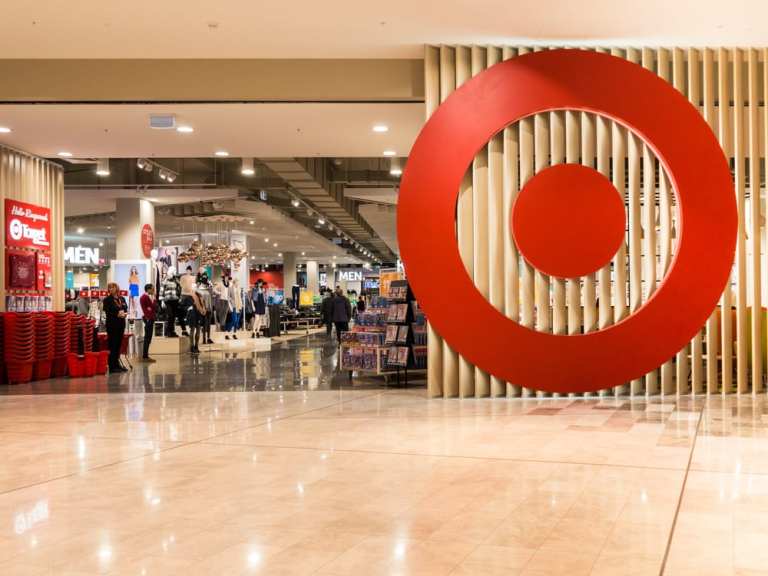
Target’s Q4 earnings report was something of a mixed bag in terms of outcomes. Earnings per share came in ahead of expectations at $1.69, as opposed to the $1.65 forecast – bringing net income for the quarter to $843 million. Target reported $799 million in net income this time last year. Same-store sales growth met expectations at 1.5 percent.
But revenue came in below expectations, with $23.4 billion in sales as opposed to the $23.5 billion expected, though still ahead of the $22.98 billion from the year-ago period. The miss, according to Target, was driven mostly by weaker-than-expected performance in toys, electronics and home goods during the holiday season.
However, the season was not without its bright spots, particularly around digital sales. The retailer saw a 20 percent uptick in online sales during Q4 – a less impressive bump than the 31 percent growth it reported both during the previous quarter and during Q4 of 2019. But according to Target’s reports, much of the Q4 growth was driven by an uptick in consumption of same-day services by consumers.
The year 2019 was a big one for Target when it came to expanding its lineup of same-day offerings. Via Shipt, the grocery delivery platform it acquired in 2017, Target has expanded same-day delivery of store items for a $99 annual fee. Additionally, Target has expanded its buy online, pick up in-store (BOPIS) offerings as well as its curbside grocery pick-up locations. It seemed those expansions had paid off as 2019 came to a close, as the firm reported that same-day services accounted for more than 80 percent of its comparable digital sales growth during the period.
“The strategic investments we’ve made over the past several years to elevate the shopping experience, curate our multi-category assortment at scale and deliver ease and convenience through our fulfillment capabilities are deepening our relationship with our guest,” CEO Brian Cornell said of the most recent results.
Apart from its eCommerce expansion, Target has also spent much of the last year making capital improvements in their brick-and-mortar locations, and focusing on a harder push into personal care and apparel. Though many areas underperformed saleswise during Q4, apparel, beauty and wellness were solidly growing performers.
As for what’s next, Target was the latest Fortune 500 player talking about the Coronavirus and its unpredictable effects on this quarter and beyond. Cornell noted that as of yet, the company has not significantly figured COVID-19 into its guidance for the future, as thus far it has not had a large impact on Target. However, that could change, he noted, as the situation is evolving daily. The company has formed a team that meets daily to discuss potential factors, such as the rate of workers returning to factories and the state of ports.
Cornell added that although the outbreak has not yet had massive effects on Target’s business, it is having an observable effect on consumer behavior, noting that they have seen “aggressive shopping” throughout their stores.
“We’ve certainly seen a U.S. consumer who is starting to stock up on household essentials, disinfectants, food and beverage items – all those staple items that the CDC has recommended,” Cornell said on the post-earnings call with analysts. Whether that trend will continue remains unknown, he noted.
Despite the uncertainty, however, Target is forecasting $1.55 to $1.75 earnings per share, and for same-store sales to grow in the low single digits. That is roughly synced to analysts’ estimates of $1.66 per share on revenue of $18.19 billion and forecasts that same-store sales would grow by 2.7 percent in the quarter.
As for the full year, Target is looking for earnings ranging between $6.70 to $7 per share, compared with analysts’ estimates of $6.87. It said same-store sales will grow by the low single digits, which is compatible with analysts’ estimates of 3.2 percent.
Additionally, Target told investors that 2020 will bring expansion to their same-day services roster, as well as continued experimentation with their brick-and-mortar store design. The retailer will begin adding fresh grocery and alcohol beverages to its Drive Up and in-store pickup services roster. Grocery expansions will get their first test this spring in Minneapolis before expanding to at least half the chain by holiday 2020. Alcoholic beverage pickups will start in Florida and Oregon and then expand throughout the full chain by next year’s holiday season.
Target also described the 36 small-format stores it plans to open in 2020, as well as the upcoming “convenience store” concept shops, designed to be tucked into urban hubs. The first lease for one of those 6,000-square-foot, small-format stores is expected to be signed in 2020, with an opening provisionally slotted for 2021. Those stores, according to Target executives, will be optimized for online order and rapid curbside pick-up.